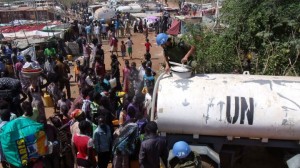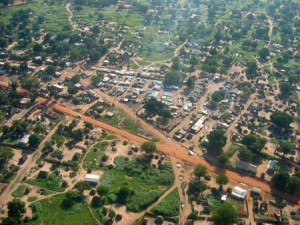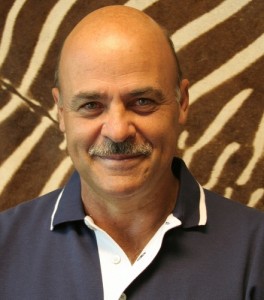United Nations peacekeepers are struggling to stop a humanitarian catastrophe in South Sudan after hundreds of civilians were killed last week by anti-government forces. Attempting to escape a conflict between government and rebel forces that is growing increasingly ethnic in nature, up to 22,000 civilians are seeking refuge within the U.N. base in the city of Bentiu. Water and sanitary facilities, however, are running low and peacekeepers fear that hundreds more could die within days as a result of these conditions.

The U.N. reports that on April 15 and 16, hundreds of people were massacred in Bentiu after rebel forces took the town from government forces in a conflict that first began in the summer of 2013. In one mosque alone, the rebels are accused of killing up to 200 people who had sought shelter there from the violence. The Washington Post reported that a top U.N. aid official described how “piles and piles” of bodies littered the streets, the mosque, and even hospitals during the rebel rampage. Currently, U.N. peacekeepers are helping to collect the bodies throughout Bentiu.
Violence in South Sudan, a volatile country that recently voted for independence from Sudan in 2011, erupted after President Salva Kiir accused his vice president, Riek Machar, of attempting a coup in July 2013. Machar was subsequently dismissed as vice president and now leads a rebel group seeking to overthrow Kiir’s government. Exacerbating the conflict, however, is the growing importance of ethnicity in determining who is friend or foe. President Kiir is an ethnic Dinka while Machar is a Nuer. Al-Jazeera reports that in Bentiu, the capital of the ironically named Unity province where the recent massacre occurred, one can find numerous ethnic groups, including Dinka, Nuer, Darfuri, and Misseriya Arabs. Insecurities regarding whether one’s neighbor is a potential enemy for being a different ethnicity is thus polarizing the city, resulting in thousands of people fleeing the possibility of future massacres.
In an attempt to protect civilians from reprisal attacks throughout the country, U.N. peacekeepers have allowed thousands to seek refuge within their bases. While attempting to ensure safety for these civilians, however, the results are mixed. Reuters reports that after the mainly Nuer rebels seized Bentiu, Dinka residents of the town of Bor in South Sudan’s Jonglei state attacked a U.N. base that sheltered up to 5,000 mostly Nuer people. Some 58 people died and 98 were injured after the Dinka had deceived the peacekeepers into believing that their protest was peaceful before opening fire on the base.
Furthermore, sanitation and water supplies within the bases are being stretched thin as more and more civilians arrive to seek refuge by the day. Tony Lanzer, the U.N.’s representative in South Sudan, stated that the base in Bentiu only had one liter of water per person available per day. Additionally, a growing public health crisis is emerging as sanitary facilities can no longer sustain the growing number of people inside the bases. Some 350 people, for example, are forced to share one toilet. Raphael Gorgeu, the head of Doctors Without Borders in South Sudan, warns that people will die inside Bentiu’s U.N. base within days because of the bleak water and sanitation situation.
Prospects for a quick resolution to the conflict in South Sudan are nil. Reuters reports that a January ceasefire between the belligerent parties has never taken hold. Meanwhile, the East African IGAD group has attempted to organize peace talks. The recent massacre, however, has led to the postponement of these talks until April 28. How this conflict will end is uncertain, but for a multiethnic country with one of the world’s lowest standards of living, one can assume that a successful resolution will not come quickly or easily.


